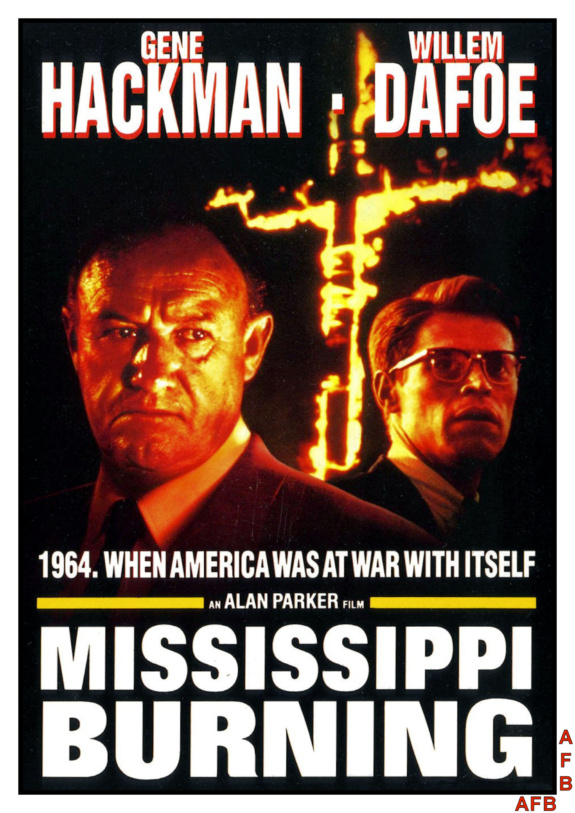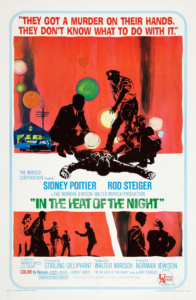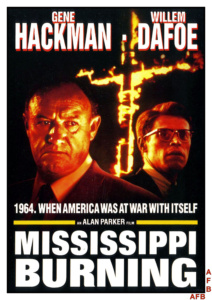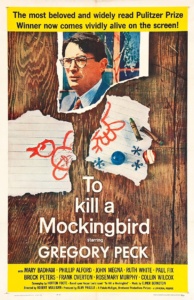
- This event has passed.
Mississippi Burning (1988)
March 28 - March 29

Showtimes:
Thu Mar 28 at 7 PM
Fri Mar 29 at 2 PM
Lincoln Theater is pleased to present “Mississippi Burning,” the second film in a new film series – SCREEN THOUGHTS, presented by host, Christine Merser. This first season will focus on America’s Racial Struggles on the Screen. Christine will present a fifteen-minute introduction to each film, which will not give anything away, but give you some insight as to what to note along the way. After the film, she will lead a discussion around the historical context, how the film affected the public when it was released, and in some cases, it’s continued value for society.
For more info on the entire series, and to buy series subscriptions (all 4 films for the price of 3) click here!
When a group of civil rights workers goes missing in a small Mississippi town, FBI agents Alan Ward (Willem Dafoe) and Rupert Anderson (Gene Hackman) are sent in to investigate. Local authorities refuse to cooperate with them, and the African American community is afraid to, precipitating a clash between the two agents over strategy. As the situation becomes more volatile, the direct approach is abandoned in favor of more aggressive, hard-line tactics.
Running Time: 2 hours, 5 minutes
“Mississippi Burning is a powerful film released in 1988, directed by Alan Parker. Set in 1964 Mississippi during the Civil Rights Movement, it addresses the deeply entrenched racism and systemic injustice faced by African Americans. The story follows two FBI agents, played by Gene Hackman and Willem Dafoe, who are dispatched to investigate the disappearance of three civil rights activists. As they delve into the case, they confront the Ku Klux Klan and a town deeply divided along racial lines. The film highlights the struggle for equality, the defiance of segregation, and the violent resistance faced by those fighting for civil rights. “Mississippi Burning” explores the complex and harrowing reality of racial prejudice, shining a light on the atrocities committed during that era and emphasizing the importance of justice and equality.” – Christine Merser
ABOUT THE SERIES!
Ah the issues in our complicated country, where passion prevails. And, what is one of the easiest ways to change hearts and minds? Telling stories.
There is no doubt that film has sometimes charted the course of history, and provided a vehicle for changing hearts and minds. Take for example, our first film in the series, In the Heat of the Night. When Sidney Poitier was offered the role, the script had a businessman slap him across the face, and he would not react. A scene that had played out for decades in other films. He wanted the role. He told the studio he would do it, but only if he can slap the man back. And, he also said it had to be in his contract that it couldn’t be cut from the film when it was shown in the south, which often happened in those days. When the film premiered, it was heralded in news across the world and dubbed the ‘slap that was heard around the world.’ It was the first time a black man was shown standing up to a white man. Monumental.
Each of the films in the series have such interesting histories, both in their production and often their reception by the public. Christine will do a fifteen minute introduction to the film, which will not give anything away, but give you some insight as to what to note along the way. After the film, she will lead a discussion around the historical context, how the film affected the public when it was released, and in some cases, it’s continued value for society.
 In the Heat of the Night – February 8 & 9
In the Heat of the Night – February 8 & 9
“In the Heat of the Night” is a critically acclaimed film released in 1967, directed by Norman Jewison. Set in a racially divided small town in Mississippi, the movie explores themes of prejudice, systemic racism, and social injustice. The story revolves around a black detective named Virgil Tibbs, superbly portrayed by Sidney Poitier, who is reluctantly enlisted to help solve a murder investigation. As Tibbs and the white police chief, played by Rod Steiger, work together, they confront their own biases and tackle the deeply ingrained racism within the community. “In the Heat of the Night” is a powerful and thought-provoking film that sheds light on the pervasive racial tensions of the era and offers a searing critique of discrimination and inequality.
 Mississippi Burning – March 28 & 29
Mississippi Burning – March 28 & 29
“Mississippi Burning” is a powerful film released in 1988, directed by Alan Parker. Set in 1964 Mississippi during the Civil Rights Movement, it addresses the deeply entrenched racism and systemic injustice faced by African Americans. The story follows two FBI agents, played by Gene Hackman and Willem Dafoe, who are dispatched to investigate the disappearance of three civil rights activists. As they delve into the case, they confront the Ku Klux Klan and a town deeply divided along racial lines. The film highlights the struggle for equality, the defiance of segregation, and the violent resistance faced by those fighting for civil rights. “Mississippi Burning” explores the complex and harrowing reality of racial prejudice, shining a light on the atrocities committed during that era and emphasizing the importance of justice and equality.
 To Kill a Mockingbird – April 18 & 19
To Kill a Mockingbird – April 18 & 19
“To Kill a Mockingbird” is a classic film adaptation of Harper Lee’s novel, released in 1962 and directed by Robert Mulligan. Set in the racially divided Deep South during the 1930s, it addresses themes of prejudice, morality, and injustice. The story is narrated through the eyes of Scout Finch, a young girl in a segregated town, as her father, Atticus Finch, a lawyer, defends a black man falsely accused of rape. The film beautifully portrays the innocence and coming-of-age of Scout, while depicting the glaring racial inequalities and the prevailing social prejudices of the time. “To Kill a Mockingbird” gracefully explores the impact of racism and bigotry on individuals and society, promoting empathy, courage, and the power of standing up for what is right. Aaron Sorkin’s play based on the book, changed the perspective of the story and brings to the forefront the black housekeeper. How it changes the theme and considerations for the story and what it says, is thought provoking. And, To Kill a Mockingbird is now the most banned book in America, making this a good time to evaluate its worth.
May Film…
to Be Announced after the series attendees vote later in the season!
 Christine Merser, a writer and recent Maine replant, has been a film reviewer for Screen Thoughts for the last ten years. Rated four stars and recently obtained by Spotify as one of their podcast series, Screen Thoughts houses her podcasts with other reviewers from the industry, as well written reviews . “I think that we humans are cemented in our point of view around explosive issues. Stories can change hearts and minds, especially when they are viewed in the darkened theater, without pushing their way into your point of view in a debate over dinner. I love going to the movies.”
Christine Merser, a writer and recent Maine replant, has been a film reviewer for Screen Thoughts for the last ten years. Rated four stars and recently obtained by Spotify as one of their podcast series, Screen Thoughts houses her podcasts with other reviewers from the industry, as well written reviews . “I think that we humans are cemented in our point of view around explosive issues. Stories can change hearts and minds, especially when they are viewed in the darkened theater, without pushing their way into your point of view in a debate over dinner. I love going to the movies.”
All ticket sales are final – Nonrefundable and Nonexchangeable.
Tickets are available for purchase at the door beginning 30 minutes before showtime, or in advance* through our online box office.
*Advance tickets or confirmation emails may be printed for admission OR you may check in with your email address at the theater box office when you arrive.


